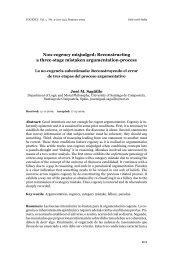Cogency v2 n2
Cogency v2 n2
Cogency v2 n2
You also want an ePaper? Increase the reach of your titles
YUMPU automatically turns print PDFs into web optimized ePapers that Google loves.
Wittgenstein and the Logic of Deep Disagreement / D. M. GODDEN & W. H. BRENNER<br />
6. Wittgenstein, Rationality and Deep Disagreements<br />
At the end of reasons comes persuasion. (Ludwig<br />
Wittgenstein, OC §612)<br />
Wittgenstein speaks of ‘persuasion’ where what is<br />
put forward has the power to induce one’s interlocutor<br />
to accept a new concept-formation, whether<br />
doing so involves a change in the person, as in<br />
moral and religious conversion, or does not do so,<br />
as in the case of new mathematical proofs. (Dilman,<br />
p. 17) 7<br />
6.1. Training & Persuasion<br />
Logically as well as temporally, enculturation into a Weltbild is prior to being<br />
able to give reasons to justify or explain something; logically as well as<br />
chronologically, being able to give and understand reasons is prior to what<br />
Wittgenstein called “persuasion,” namely a sort of rhetoric in the service of<br />
concept-formation. 8 As with the sort of training or pre-linguistic instruction<br />
he talks about early in the Investigations, persuasion has to do not<br />
with the (correct or incorrect, justified or unjustified) use of terms but with<br />
“preparation for their use” (PI §§ 26, 49).<br />
Persuasion and training have to do with introduction of new concepts,<br />
and therefore with induction into new language games of judgment and an<br />
expanded conception of what might count as a reasons or justification for a<br />
judgment.<br />
In giving reasons as premises of an argument we’re applying (or presupposing)<br />
acknowledged concepts. Giving reasons in that sense is seeking to<br />
justify a knowledge-claim.<br />
Both training and persuasion are preparations for a (new) language game.<br />
But while training is entirely pre-rational (pre-explanatory, pre-justificatory),<br />
persuasion can involve reasoning of a kind – analogical and “dialectical,” rather<br />
than demonstrative reasoning from commonly acknowledged principles and<br />
matters of fact, or experimental (inductive) reasoning from “hard data.”<br />
7<br />
This section owes much to the collection of essays from which this passage is quoted. A<br />
member of “the Swansea school,” the late Ilham Dilman was an outstanding philosopher<br />
and Wittgenstein scholar.<br />
8<br />
Here we use “rhetoric” to mean “persuasive discourse” without any pejorative connotation.<br />
57








